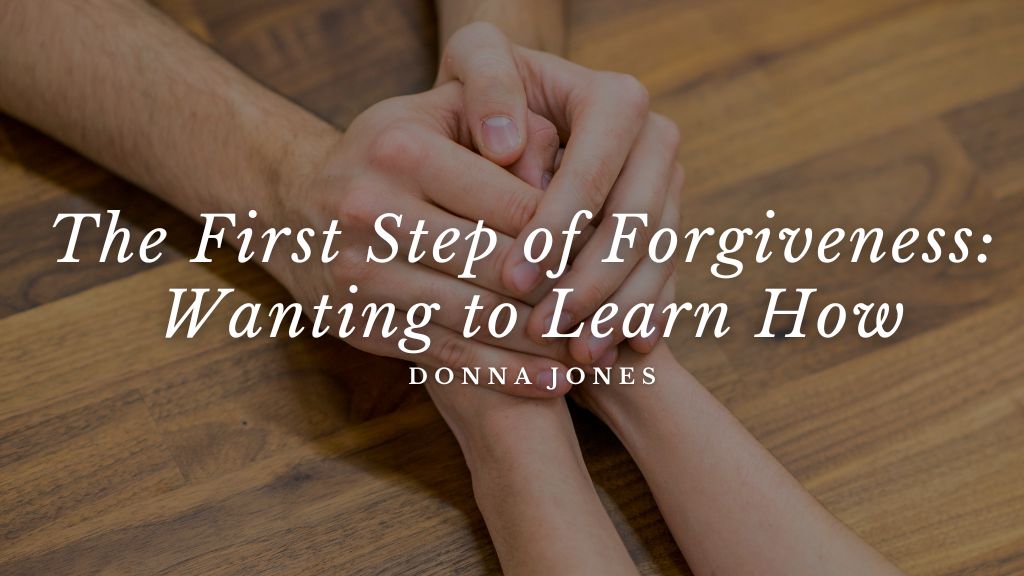The First Step of Forgiveness: Wanting to Learn How

“Help me to trust You enough to accept the full forgiveness that You offer me continually. This glorious gift cost You Your Life, and it is mine for all eternity! I’m grateful that forgiveness is at the very core of Your abiding Presence.”
– Jesus Listens, June 3rd
That relationship. Yeah, that one. When you began the relationship, you didn’t sign up for heartache or headaches, did you? Oh sure, you know conflict is part of life. Everyone knows. What you didn’t know was how deeply the spouse, child, friend, coworker, or church would wound you.
But here you are. The conflict happened. Or is happening. The hurt is real. So is the anger. And the confusion.
Enter the need for forgiveness.
Years ago, my husband worked for a thriving church. However, when the senior pastor retired, factions developed as people jockeyed for power. We became unwitting players in an unholy mess. The devastation ran so deep, some days I’d park my SUV in front of a neighbor’s empty lot and wail. I didn’t want our experience to become our children’s commentary on how Christians should treat each other.
Despite the hurt, I knew Jesus commanded me to forgive as I had been forgiven. In Matthew 6:12, Jesus taught us to pray, “Forgive us our sins, as we have forgiven those who sin against us,” but I wrestled with how to forgive. Frankly, my heart felt like someone had taken a giant sledgehammer and shattered it into a million pieces. I often found myself wondering, How does a fractured person extend forgiveness?
Forgiveness
One evening, I shared my private struggle with the worship pastor’s wife. “I know God tells me to forgive, and I want to forgive because I know I should. But I don’t know how. I don’t know if I can.” She placed her gentle hands on my shoulders, turned me to face her, and looked at me with complete compassion. She said, “Listen to me: The fact that you want to learn to forgive pleases God. He’ll show you how.” In that moment, my process of healing forgiveness began.
The first step to forgiving is wanting to learn how—if only because God says we should. But perhaps you’re in a place where your wounds are so deep you don’t want to forgive. Maybe the idea of forgiveness seems unfair. Possibly the thought of forgiveness makes you mad. May I gently place my hand on your shoulders and whisper something to you? Pray for the “want to.” Start there.
To Let Go
Biblically, to forgive means “to let go.” When we choose to forgive, we let go of our right to get even and we allow God to take over. It’s been said that “unforgiveness is like drinking poison and hoping the other person dies.” When unforgiveness reigns, our joy, contentment, and usefulness to God die slow, painful deaths. The conflict we wish would go away lives on in our hearts, minds, and souls. Ironically, our perpetrator pays no price for the poison in our soul.
As long as we cling to unforgiveness, we remain chained to past hurt, revisiting the incident in our minds over and over, wondering how to unshackle the chain. Forgiveness loosens the chain and sets us free.
However, the choice to forgive will feel difficult—maybe even impossible—if we falsely believe, one, that forgiveness means offering the offender a free pass to hurt us again. Or two, that forgiveness means saying, “What you did to me was no big deal.” On the contrary: forgiveness means the offense was such a big deal it cost Jesus His life. Since forgiveness is not giving our offender a free pass to hurt us again, the choice to forgive shouldn’t be equated with the choice to trust or be reconciled. Forgiveness takes one person, but trust and reconciliation take two.
Invitation
Inviting Jesus into the process of forgiveness makes it easier. After all, Jesus is the Master Forgiver. What’s more, Jesus understands betrayal, heartache, rejection, physical abuse, abandonment, being despised, and false accusations, just to name a few. Our Savior is called “a man of sorrows . . . acquainted with grief” (Isaiah 53:3).
You can simply say, “Jesus, I invite You into my heartache.” When we invite Jesus into our pain and ask Him to help us forgive, Jesus doesn’t shame; Jesus sympathizes. Jesus leans toward us, wraps His loving arms around us, and tenderly whispers, “I know. I’ve felt it too. I understand, and I can help.”
If you struggle with forgiveness, picture your hand in a clenched fist. Better yet, make a fist right now. Envision the issue that wounded you—the one you know you need to forgive but can’t quite find it in your heart to do so—inside your tightly held fingers, resting on your palm. Each finger represents a reason you haven’t let go: it wasn’t fair, they need to make it right, they skipped off to a new life while leaving you with their baggage, they sinned while you tried not to, you want them to pay for what they did. The list could go on.
Grace
Now, gently unfurl each finger, one by one, until the core offense lays bare. Turn your hand over and drop the offense into the nail-scarred hands of Jesus. That’s forgiveness.
It’s important to give yourself grace as you navigate the process of forgiveness, but don’t throw up your hands in despair and stop choosing to forgive, even if it takes time. Remember, forgiveness is both a choice and a process. If you follow God’s ways, if you invite Him into your hurt, and if you keep making the choice to forgive, one day you’ll wake up with the realization that unforgiveness no longer has a hold on you. The process of forgiveness will have morphed into actual forgiveness.
And you’ll be free.This article is adapted from Healthy Conflict, Peaceful Life: a Biblical Guide for Communicating Thoughts, Feelings and Opinions with Grace, Truth, and Zero Regret by Donna Jones (Thomas Nelson, 2024)
About The Author
 Donna Jones is a national speaker, church planter, pastor’s wife, and self-described “Bible-explainer” who has spoken in twenty-six states and on four continents. A graduate of UCLA with a degree in interpersonal communications, she hosts the weekly That’s Just What I Needed podcast, is the author of Seek: A Woman’s Guide to Meeting God, Taming Your Family Zoo, the Get Healthy Bible study series, and is a contributing author to the devotionals A Moment to Breathe and Arise, Daily. A contributor to Crosswalk.com, she has had several articles make the “Top Ten of the Year” list and has been on numerous television and radio shows and podcasts, including Focus on the Family Broadcast and Good Day, Dallas. Donna is passionate about equipping others to know, love, and follow God in their real, everyday lives. She wants to know, love, and follow God this way herself. She and her husband, JP Jones, make their home in Southern California.
Donna Jones is a national speaker, church planter, pastor’s wife, and self-described “Bible-explainer” who has spoken in twenty-six states and on four continents. A graduate of UCLA with a degree in interpersonal communications, she hosts the weekly That’s Just What I Needed podcast, is the author of Seek: A Woman’s Guide to Meeting God, Taming Your Family Zoo, the Get Healthy Bible study series, and is a contributing author to the devotionals A Moment to Breathe and Arise, Daily. A contributor to Crosswalk.com, she has had several articles make the “Top Ten of the Year” list and has been on numerous television and radio shows and podcasts, including Focus on the Family Broadcast and Good Day, Dallas. Donna is passionate about equipping others to know, love, and follow God in their real, everyday lives. She wants to know, love, and follow God this way herself. She and her husband, JP Jones, make their home in Southern California.

